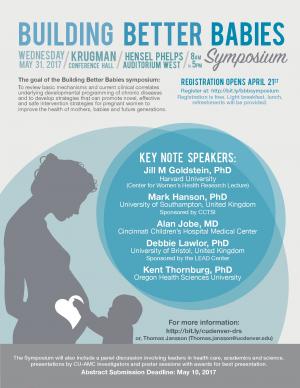Building Better Babies Symposium set for May 31
The Building Better Babies Symposium is set for 8 a.m. to 5 p.m. May 31 at the CU Anschutz Medical Campus.
The specific objectives of the symposium are to empower and inspire University of Colorado scientists and clinicians across career stages, disciplines, and schools to showcase existing strengths on our campus in the area of Developmental Origins of Health and Disease (DOHaD); to catalyze new collaborations and ideas; to review the key mechanisms underpinning early life origins of disease; to explore emerging novel therapeutic intervention approaches; to discuss the impact of the DOHaD perspective on personalized medicine, health care organizations and health care costs; and to help develop the future agenda of the Building Better Babies Program.
The symposium will feature five exceptional keynote speakers, all world leaders in developmental programming, representing the translational and interdisciplinary impact of this rapidly evolving research field. Investigators on the Anschutz Medical Campus are recognized as leaders in this research field and have brought together an exciting and inspiring program.
The Building Better Babies Program, initiated by 60 individual investigators at the campus, is a transformative and multidisciplinary initiative to highlight the critical importance of early life influences on lifelong health and adult disease. It also explores how mechanistic links between an adverse early life environment and later disease can be exploited to develop novel intervention strategies in pregnant women and infants.
The prevailing paradigm for some time has been that disease is largely caused by an interaction between genes and lifestyle. However, the DOHaD concept, now widely accepted and based on both strong epidemiological evidence and studies in animal models, supports that major chronic diseases – including neuropsychiatric disorders, diabetes, obesity, allergies, cardiovascular and lung disease – have their origins in fetal life and early childhood. This transformative discovery has profound public health consequences and will likely change the way we practice medicine.
Registration for the symposium is free, and includes a light breakfast, lunch, and afternoon refreshments. To register for the symposium: http://bit.ly/bbbsymposium
For more information on the symposium: http://bit.ly/cudenver-drs


